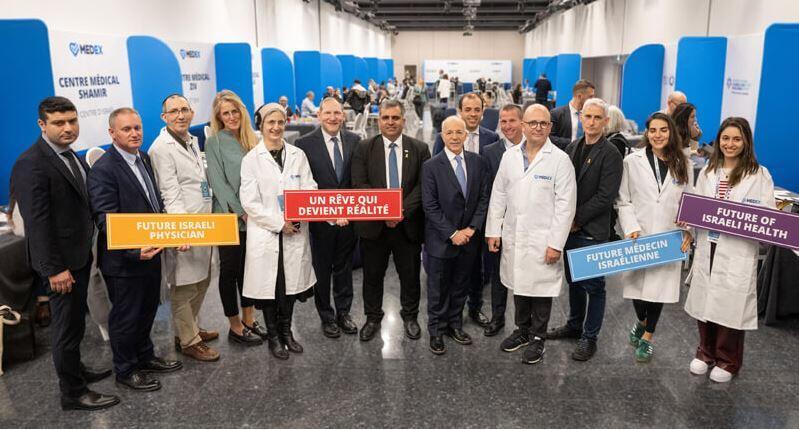Here's an uplifting tale from Jerusalem's Cinema City complex, where the offices of Nefesh B'Nefesh are discreetly tucked away. This organization, established over two decades ago, facilitates the migration of Jewish individuals from the United States and Canada to Israel. It works alongside the Jewish Agency, which serves the global Jewish community, and the Nativ program which focuses on bringing Jewish individuals from Russia.
Nefesh B'Nefesh, once scrutinized for its perceived monopoly status and annual state allocation of $14 million, is now praised for its innovative approach to addressing Israel's shortage of medical professionals.
Israel faces a challenging scenario with only 3.4 doctors per 1,000 residents, compared to the OECD average of 3.7. This figure varies drastically across regions, with Tel Aviv boasting 5.2 doctors per 1,000 residents while outlying areas dip to 3.1.
Despite recent increases in medical student placements by the Health Ministry, the supply of doctors continues to dwindle due to population growth and an aging workforce. Many physicians who migrated from former Soviet Union countries in the 1990s are now retiring, exacerbating the shortage.
In response, Nefesh B'Nefesh, in collaboration with the Health Ministry and Aliyah Ministry, has initiated a program to import Jewish doctors from the United States and Canada. The Health Ministry aims to integrate 2,000 such professionals over the next five years, with the project's total cost estimated at $60 million, evenly split between government funding and Nefesh B'Nefesh contributions.
Currently, 100 Jewish-American and Jewish-Canadian doctors are undergoing licensing procedures with the Health Ministry, marking a promising start. The true litmus test will be in the upcoming summer when those committed to relocating to Israel finalize their plans.
This initiative represents a departure from the conventional immigration process for doctors. Traditionally, doctors would first relocate to Israel before navigating bureaucratic hurdles to secure professional credentials, a process often protracted and burdensome.
Nefesh B'Nefesh's approach streamlines this process by convening prospective immigrant doctors at conferences in the United States, where they submit necessary documents. Health Ministry representatives and other relevant bodies are present to expedite bureaucratic procedures, including document verification and preliminary approval.
Furthermore, these conferences serve as networking opportunities, connecting migrant doctors with potential employers from Israel's healthcare sector. Some doctors are offered financial incentives, such as grants from the Recovery Administration for the Rehabilitation of the Periphery, to practice in underserved areas.
Nefesh B'Nefesh also provides mentorship to facilitate migrants' integration, addressing language learning and family needs. Early successes include the issuance of employment licenses to participating doctors, with job placements awaiting them in Israel.
While commendable, this model's scalability hinges on sourcing doctors from diverse regions beyond the United States and Canada. Efforts are underway to replicate this approach in countries like France and Argentina, where economic conditions or government incentives may encourage migration.
However, challenges persist, particularly in integrating doctors from Russia and Ukraine who have already migrated. Despite approximately 900 medical professionals relocating to Israel in the past two years, only a fraction have received licenses to practice, primarily due to stringent licensing requirements.
Recognizing the urgency of the situation, the Health Ministry is contemplating reforms, including reducing the seniority threshold for exemption from licensing exams and introducing temporary permits for immediate employment.
Advocacy groups like the Million Lobby are advocating for further reforms to facilitate the integration of migrant doctors into the healthcare system, emphasizing the valuable human resource they represent. As Israel grapples with its healthcare workforce crisis, innovative solutions and collaborative efforts offer hope for a sustainable resolution.
If this innovative approach proves successful, with thousands of migrant doctors joining the Israeli health system within a few years, it might be beneficial to extend this accomplishment to other fields. In the 1990s, Israel saw an influx of highly skilled immigrants. There were challenges and adaptation issues, but ultimately, the majority found their place in the workforce, effectively rescuing the economy.
However, in the years that followed, we failed to address our human capital challenges at a fundamental level, and now we find ourselves on the cusp of needing another rescue as this generation approaches retirement. It's not just doctors, but also nurses, therapists, physiotherapists, communication clinicians, occupational therapists and science teachers. These are all sectors suffering from a severe worker shortage.
To combat this, it's not enough to think long-term and invest in quality education for all Israeli children, from all sectors. We also need to incentivize, in the short term, the immigration of experienced professionals who will contribute to the Israeli health and education systems.
Meanwhile, we're at a point where the health system's needs are surging due to war, and simultaneously, we see an opportunity. The rising tide of antisemitism worldwide is distressing and disheartening, but it also provides an opportunity to draw in a high-quality workforce that might not previously have considered relocating. The reasons these individuals come could be due to feelings of insecurity, financial motivations, a sense of mission or Zionism, or a combination of all of these.
Throughout the years, from the establishment of Israel through the immigration wave of the seventies when my family moved, and until today, immigrants have always arrived for a mixed bag of reasons. The essential thing is that they come. This will not solve all our problems, as our real issues won't disappear until we take a hard look at ourselves and acknowledge them, but it will undoubtedly offer some assistance.




